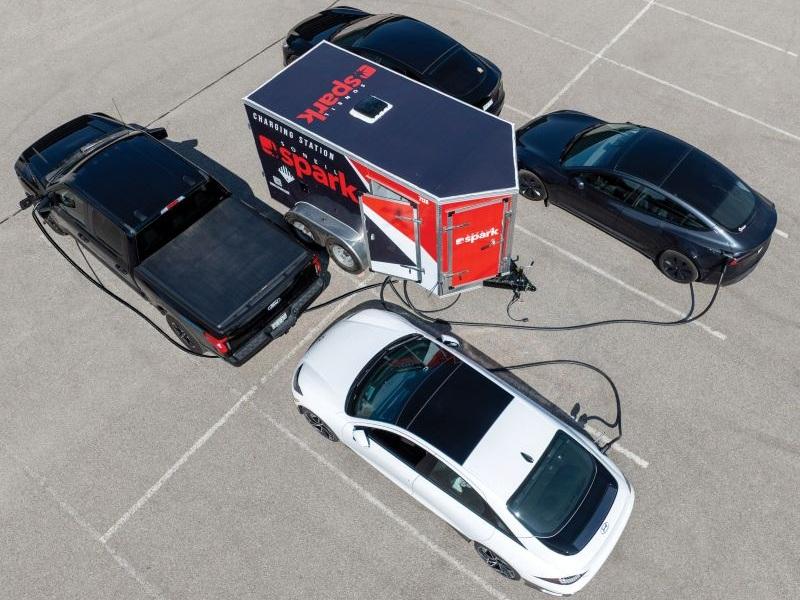
"Too much" and too quickly is how a senior figure from the Pembina Institute describes a Canadian tariff on electric vehicles (EVs) made in China, emphasizing the need for government support for EV affordability and adoption.
"Our perspective is that this 100 per cent tariff is too fast and is a bit too high, and is not targeted enough," Hongyu Xiao, a senior analyst on the transportation team of the Calgary-based think tank, told Sustainable Biz Canada in an interview.
The Canadian government announced a 100 per cent surtax will be slapped on Chinese-made EVs starting Oct. 1. Additionally, a 25 per cent tariff was put on imports of Chinese steel and aluminum starting Oct. 15.
In June, the Canadian government announced it would consider imposing higher costs on Chinese EVs, which are cheaper than models made in North America, to protect the domestic industry. Canada joined the U.S. and the European Union in applying tariffs on the Chinese products.
The proposal sparked concern from environmental groups worried that elevated costs will slow the EV transition, and impact Canada’s efforts to meet its climate-change mitigation goals.
Opposing reactions to the tariffs
Private sector labour union Unifor, however, praised the tariffs. Lana Payne, Unifor’s national president, said in a release, “There is no justification to trade away high-paying, high-skilled jobs for cheap high-carbon intensive vehicles (built) under deplorable working conditions. Our union welcomes the Canadian tariff that matches the U.S. to present a united front in support of the auto sector and the communities that benefit from it.”
Clean Energy Canada, a Vancouver-based think tank, was more critical of the decision. “Unfortunately, Canada made a decision today that will result in fewer affordable electric vehicles for Canadians, less competition, and more climate pollution,” Joanna Kyriazis, the think tank’s director of public affairs, said.
Xiao said the Chinese-made EV tariffs should be matched with a trade barrier on internal combustion engine cars from China, and paired with a "robust review of the impact of China's subsidization practices." Like Kyriazis, he backed a European approach that targets tariffs per manufacturer, instead of a blanket policy.
As of today, the only Chinese-made EVs sold on the Canadian market are Teslas, but Chinese automaker BYD is also expressing interest, CBC News reports.
How the tariffs will affect the Canadian EV market is not known, Xiao said, as strong modelling does not yet exist. If the trade barriers do support domestic EV manufacturing, there could be greater EV adoption in the long-term, he continued.
Also critical is to maintain programs that boost EV affordability and adoption, Xiao added. An example is backing EV charger installations nationwide.
Balancing the tariff and keeping up EV programs
The Pembina Institute published its reply to Finance Canada’s consultation period on policies to protect the Canadian auto industry and its growing EV sector from “unfair” Chinese trade practices such as oversupply and weak environmental standards. The government would need to thread the needle on supporting Canadian workers while ensuring an economical EV market, it states.
Trade restrictions must balance “the interests of autoworkers, Canadian manufacturers, and consumers” while considering China’s subsidies and Canada’s trade agreements, Monica Curtis, Pembina’s senior director of communities and decarbonization, said in the document.
Curtis and Xiao urge the Canadian government to maintain course on zero-emissions vehicle incentives to encourage adoption of EVs.
Curtis wrote it is critical to consider the broader effectiveness of incentives to build EV infrastructure like chargers. Government initiatives to drive EV adoption such as a sales mandates are non-financial tools that Curtis prescribes.
The Medium- and Heavy-Duty Zero-Emission Vehicles program has only released about 10 per cent of its $547.5-million budget, for example. In contrast, programs such as the Zero Emission Vehicle Infrastructure Program have run out of money or are winding down.
Developing or continuing the incentives to support affordability, local production and jobs is backed by the Pembina Institute. Examples given by Curtis are programs that encourage automakers to provide lower-cost EVs by granting bonuses for EVs assembled in Canada or incentives based on reductions of life-cycle carbon emissions.
Kyriazis concurred, recommending an extension of the Incentives for Zero-Emission Vehicles program until 2028 when more mainstream Canadian-made EVs come to market, lowering the price cap on rebates to $50,000 and introducing rebates for used EVs.
The federal government should seek a promise from Ontario to introduce consumer EV rebates in exchange for the tariffs, Kyriazis said.
EV data security and cybersecurity are also concerns. Regulations such as vehicle-to-grid technology will be necessary as the technologically advanced cars grow in use and connect to Canada’s electrical system.










